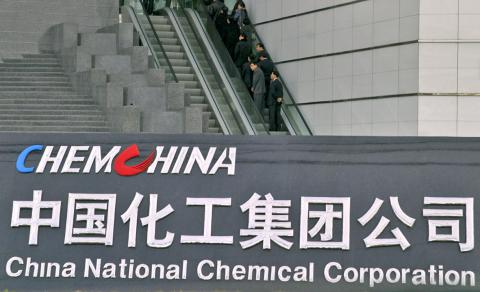China National Chemical Corp (ChemChina, 中國化工) improved its offer to buy Syngenta AG, proposing a complex two-stage takeover that would mark the biggest-ever acquisition by a Chinese company, people with knowledge of the matter said.
State-owned ChemChina offered to purchase 70 percent of Syngenta now, with an option to acquire the remaining 30 percent of the company at a later date, said the people, who asked not to be identified because the information is private.
Basel-based Syngenta, the world’s largest pesticide maker, is to hold a board meeting before the end of the year to vote on the deal, the people said.

Photo: Reuters
While talks are advanced, no agreement has been reached and there is no guarantee a deal would be completed, they said.
The architecture of the proposal would allow ChemChina to work with Syngenta to integrate the two businesses before assuming complete control of the Swiss company, the people said.
During the discussions, ChemChina proposed a number of similarly structured deals, whereby it would acquire Syngenta in two stages. Syngenta’s US depositary receipts jumped as much as 8.1 percent in after-hours trading on Friday.
ChemChina offered about 470 Swiss francs per share for 70 percent of Syngenta, one of the people said. At that price, the company would have a market value of about US$44 billion. ChemChina revised the proposal after its previous cash offer of 449 francs per share was deemed too low. Syngenta’s shares closed at 374.5 francs on Friday.
Pressure is growing for Syngenta to do a deal in the aftermath of an agreement between Dow Chemical Co and DuPont Co to merge, creating a company with a market value of more than US$100 billion and the world’s largest agriculture business. That deal might trigger a wave of consolidation in the industry as competitors dash to reposition themselves.
ChemChina Chairman Ren Jianxin (任建新) met with Syngenta in Europe last week to discuss a revised proposal, people familiar with the matter said.

Taiwan’s foreign exchange reserves hit a record high at the end of last month, surpassing the US$600 billion mark for the first time, the central bank said yesterday. Last month, the country’s foreign exchange reserves rose US$5.51 billion from a month earlier to reach US$602.94 billion due to an increase in returns from the central bank’s portfolio management, the movement of other foreign currencies in the portfolio against the US dollar and the bank’s efforts to smooth the volatility of the New Taiwan dollar. Department of Foreign Exchange Director-General Eugene Tsai (蔡炯民)said a rate cut cycle launched by the US Federal Reserve

Handset camera lens maker Largan Precision Co (大立光) on Sunday reported a 6.71 percent year-on-year decline in revenue for the third quarter, despite revenue last month hitting the highest level in 11 months. Third-quarter revenue was NT$17.68 billion (US$581.2 million), compared with NT$18.95 billion a year earlier, the company said in a statement. The figure was in line with Yuanta Securities Investment Consulting Co’s (元大投顧) forecast of NT$17.9 billion, but missed the market consensus estimate of NT$18.97 billion. The third-quarter revenue was a 51.44 percent increase from NT$11.67 billion in the second quarter, as the quarter is usually the peak

Nvidia Corp’s major server production partner Hon Hai Precision Industry Co (鴻海精密) reported 10.99 percent year-on-year growth in quarterly sales, signaling healthy demand for artificial intelligence (AI) infrastructure. Revenue totaled NT$2.06 trillion (US$67.72 billion) in the last quarter, in line with analysts’ projections, a company statement said. On a quarterly basis, revenue was up 14.47 percent. Hon Hai’s businesses cover four primary product segments: cloud and networking, smart consumer electronics, computing, and components and other products. Last quarter, “cloud and networking products delivered strong growth, components and other products demonstrated significant growth, while smart consumer electronics and computing products slightly declined,” compared with the

The US government on Wednesday sanctioned more than two dozen companies in China, Turkey and the United Arab Emirates, including offshoots of a US chip firm, accusing the businesses of providing illicit support to Iran’s military or proxies. The US Department of Commerce included two subsidiaries of US-based chip distributor Arrow Electronics Inc (艾睿電子) on its so-called entity list published on the federal register for facilitating purchases by Iran’s proxies of US tech. Arrow spokesman John Hourigan said that the subsidiaries have been operating in full compliance with US export control regulations and his company is discussing with the US Bureau of